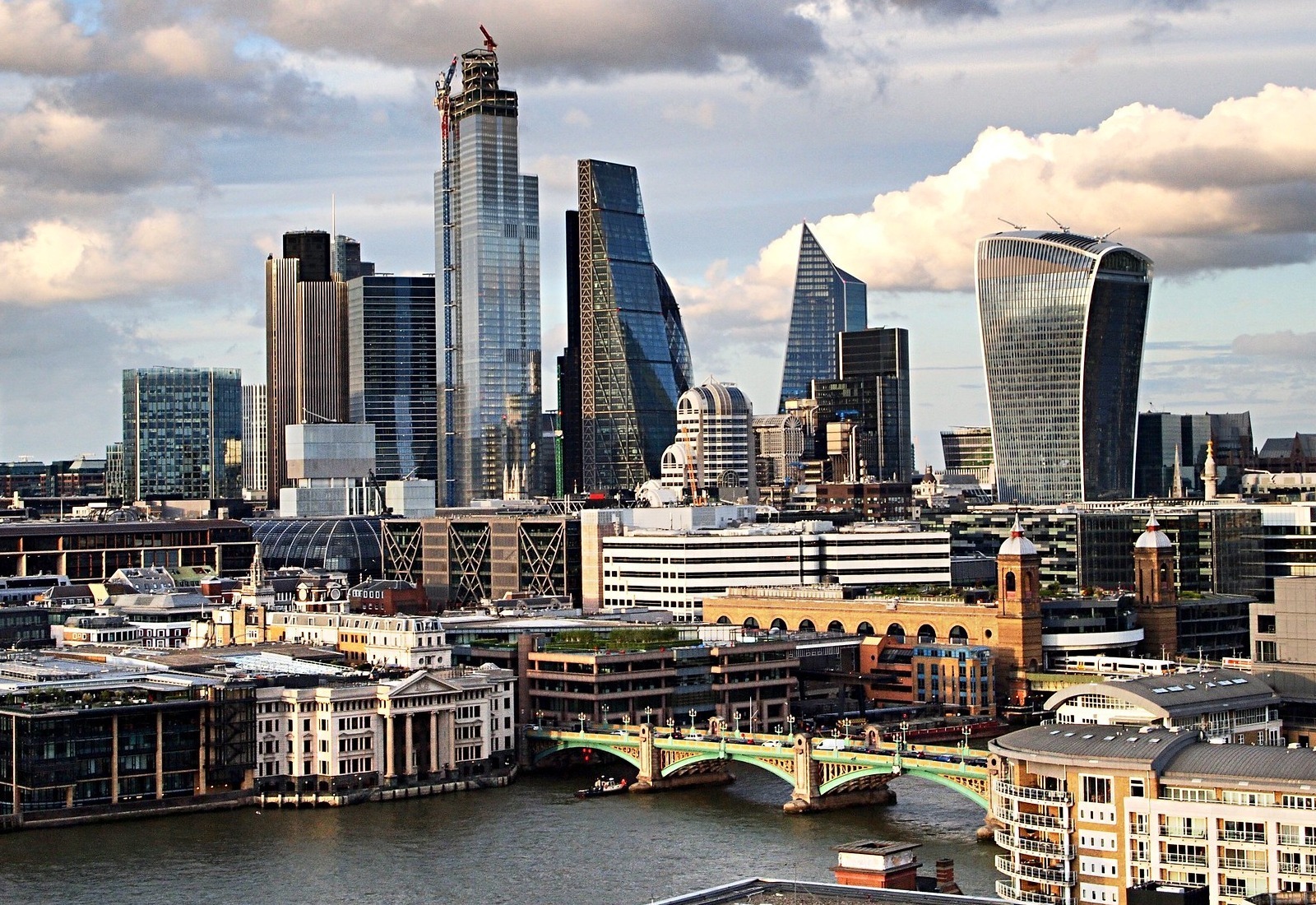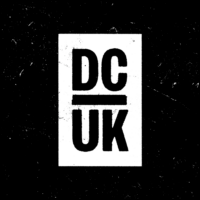Investments in Britain by Russian oligarchs, often involving “dirty money”, have been widely condemned across the UK’s political spectrum as Boris Johnson’s government identifies Vladimir Putin as a growing threat to the UK.
However, a far larger proportion of Britain’s assets is being bought up by the UK’s oil-rich repressive allies in the Middle Eastern Gulf states — which own over five times more of Britain’s economy than Russia, figures show.
The Gulf regimes, which are run by unelected Kings or Emirs who routinely torture dissidents and ban political parties, elections and independent media, have been allowed to buy up over £140-billion in UK assets.
This includes prime property in London and stakes in household-name UK companies and media outlets.
Most of this spending derives from these countries’ giant “sovereign wealth funds” — where their huge oil and gas revenues are deposited. These funds are controlled by members of the ruling royal families.
Some have gone on a Covid-19 ‘bargain hunting’ spending spree, snapping up new assets.
The largest investments in Britain have been made by Saudi Arabia and Qatar, which together account for over £100-billion. The United Arab Emirates and Kuwait have been allowed to make investments worth over £40-billion combined.
Spending is also undertaken in the UK by Bahrain and Oman, although lack of transparency makes the true investment figures from these regimes unknown.
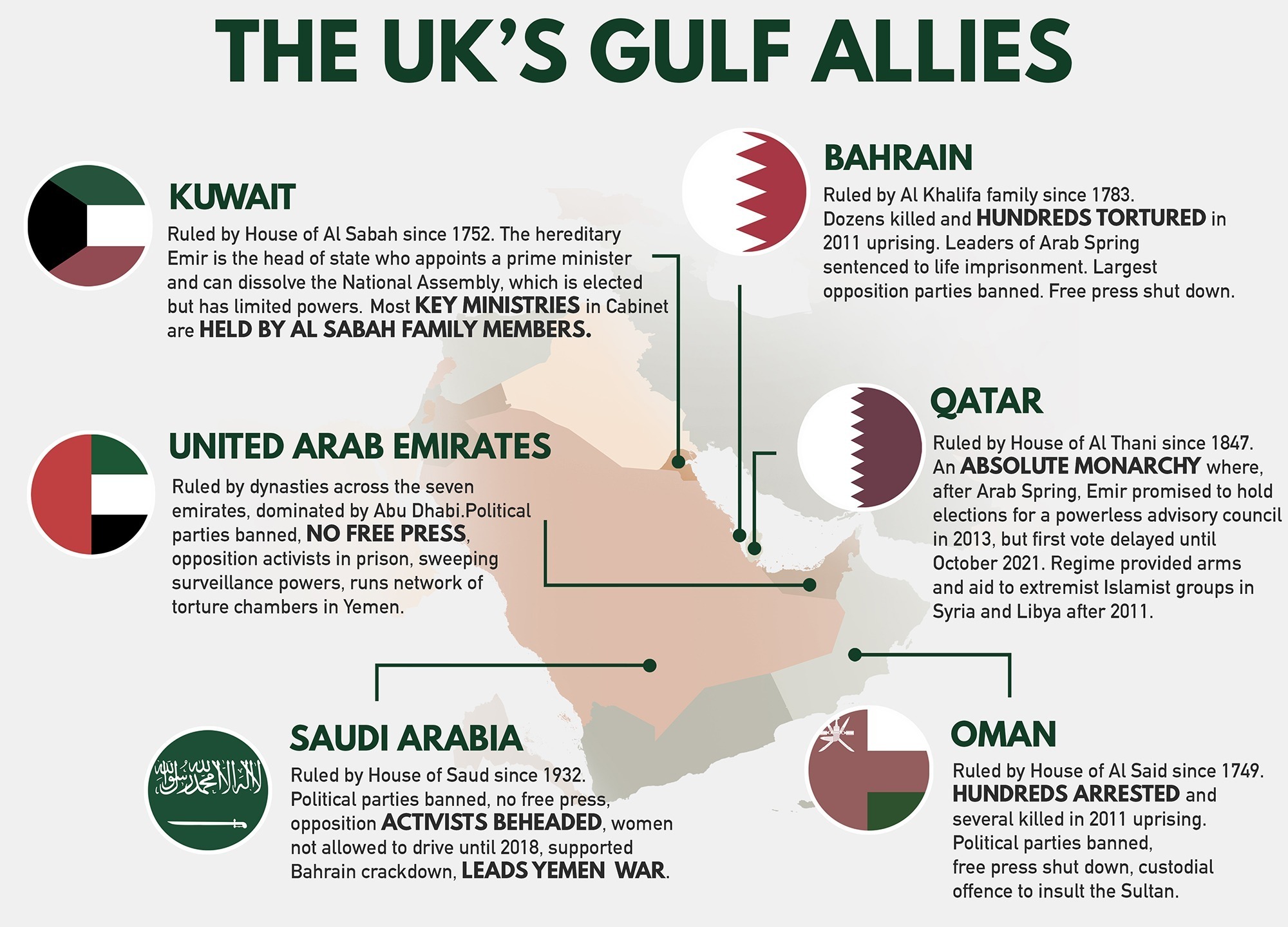
Gulf investments in the UK, which have been actively encouraged by UK ministers, are increasing British economic reliance on regimes whose approach to democracy and human rights is antithetical to much-vaunted “British values”.
Yet Whitehall has in recent years deepened its support for these regimes and helps to keep them in power by training their internal security forces and selling them large quantities of arms.
It is likely the UK allows such a permissive investment climate for Gulf autocrats partly in return for their making huge weapons purchases.
The British royal family also plays a key role in bolstering these dictatorships and cultivating political and trade relations.
The recent “Russia report” by a British parliamentary committee noted that “The UK has been viewed as a particularly favourable destination for Russian oligarchs and their money”. Yet investments by Russia in the UK may amount to just £25.5-billion, less than half the Saudi level alone.
China’s investment portfolio in the UK is believed to amount to around £51-billion.
Professor Madawi al-Rasheed, a Saudi analyst at the London School of Economics, told Declassified: “By giving Gulf countries the opportunity to invest in Britain despite their record on human rights, Britain becomes more dependent on these countries and less able to voice a critical opinion on their autocratic rule”.
She added: “Britain does not only sell arms to these countries but also shields them from criticism in international organisations. We all remember how Britain used its position at the UN and supported Saudi Arabia’s application to have a seat at the UN Human Rights Council”.
Saudi Arabia: £60-billion
Saudi Arabia, whose internal security force is trained and armed by Britain, has made investments in the UK of around £60-billion.
Most of these are through its oil-rich Public Investment Fund, which is chaired by Mohammed bin Salman, the country’s de facto ruler who is accused by the US of ordering the murder of journalist Jamal Khashoggi.
Last year, Saudi Arabia bought a £598-million stake in British oil giant BP, and another in telecoms corporation BT, as part of a Covid-19 ‘bargain hunting’ spree.
Saudi investors also own a part of Anglo/Dutch oil giant Shell as well as The Independent and Evening Standard media outlets, and have joint ventures with HSBC and Jaguar Land Rover.
Kingdom Holding Company, which is run by Saudi Prince Alwaleed bin Talal, maintains a majority interest in the Savoy Hotel in central London, while apps run in the UK, such as Twitter, Uber, Snapchat and Slack are also part-funded by Saudi money.
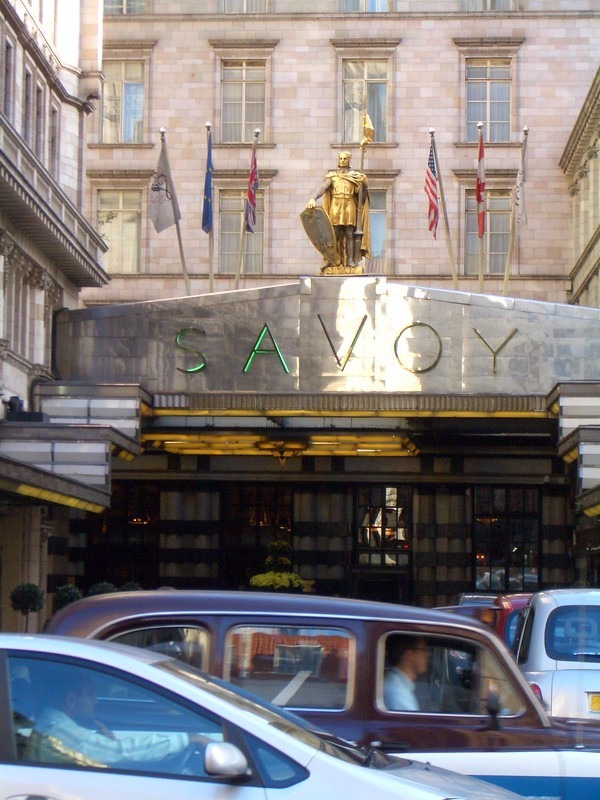
In 2018, then foreign secretary Boris Johnson welcomed Saudi Arabia’s “pledge to bring £65-billion to the UK over the next 10 years” – apparently new investments. The same year, former trade secretary Liam Fox said Britain was committed to helping Saudi Arabia become a “global investment powerhouse”.
The Saudis ‘soft power’ strategy also involves millions of pounds of donations to leading British universities including Oxford, Cambridge, the London School of Economics, Durham and Edinburgh.
Qatar: £40-billion
The UK operates a joint air force squadron with Qatar and the two countries were close allies during the Libya war of 2011, when the authorities in Doha bankrolled Libyan rebel Islamist groups which helped overthrew the Gaddafi regime.
Qatar has been allowed to invest more than £40-billion in the UK and its assets include Harrods, the Shard building in central London, Canary Wharf and a stake in the London Stock Exchange.
The Qatar Investment Authority – the country’s sovereign wealth fund — also owns 22% of supermarket group Sainsbury and 5.9% of Barclays bank. Abdulhadi Mana Al-Hajri, the brother-in-law of Qatar’s emir, Sheikh Hamad al-Thani, bought London’s Ritz hotel last year for £700-million.
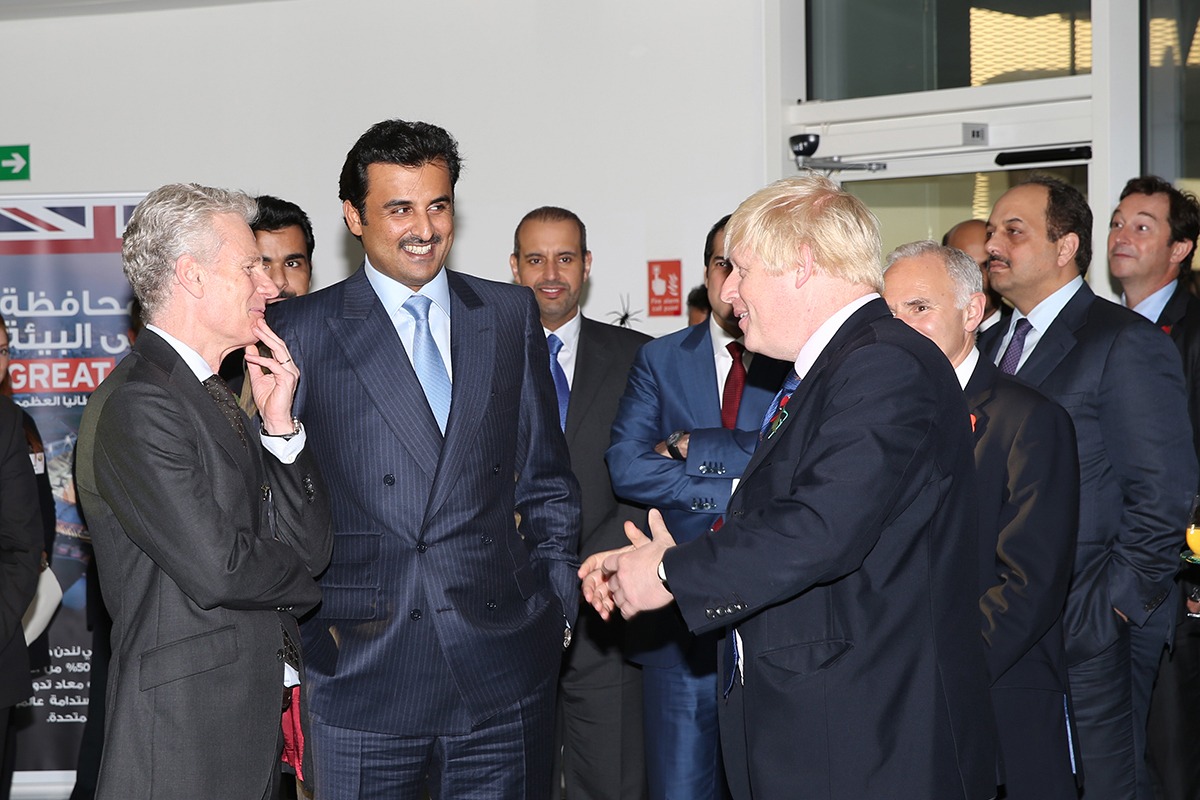
Following the launch of the UK government’s Qatar-UK Business and Investment Forum in 2017, Qatar pledged to invest an additional £5-billion in Britain over the following three years. As part of this, by 2018 Qatar had spent almost £3-billion in the UK property market in just 16 months.
As with the Saudis, British politicians have actively sought Qatari investment. In 2013 Lord Deighton, then the UK Treasury minister and a former chief operating officer of Goldman Sachs, visited the country to solicit investments in British infrastructure.
The following year Deighton met Qatar’s Emir at the Olympic Village in London. In 2016, he was named chairman of Heathrow Airport Holdings, a company in which the Qatar Investment Authority has a 20% stake.
Kuwait: £17-billion
The small Gulf state of Kuwait, which hosts around 40 British troops and where UK Reaper drones are believed to be based, has been allowed to invest over £17-billion in the UK and has stakes in companies including BP, Vodafone and HSBC.
The Kuwait Investment Authority (KIA), which manages state revenues from the world’s fourth-biggest oil exporter, has an estimated $342-billion in assets, and is one of the world’s largest funds.
The international arm of the KIA, the Kuwait Investment Office, is actually based in London. Paid members of its investment advisory committee include former chancellor and foreign secretary Philip Hammond and former foreign minister David Howell.
United Arab Emirates: £25-billion
Wealthy investors from the United Arab Emirates (UAE) are believed to have acquired assets worth over £13-billion in the UK while investments made by Emirati banks in Britain amount to around £12-billion. The investors are mainly royals in the ruling families of the Emirates.
Sheikh Khalifa, the billionaire president of the UAE and emir of Abu Dhabi, the UAE’s leading emirate, has a portfolio worth more than £5.5-billion in the UK, mainly consisting of property in London.
From 2008-15, Abu Dhabi invested a further £5.7-billion in British companies and assets, including a £1.5-billion stake in Thames Water and a £1-billion investment in a Manchester residential development company.
Another billionaire, Sheikh Mohammed al-Maktoum, the emir of Dubai, owns property worth over £100-million in the UK, including much of Newmarket, a horse racing town in eastern England, while being the largest owner of racehorses in Britain.
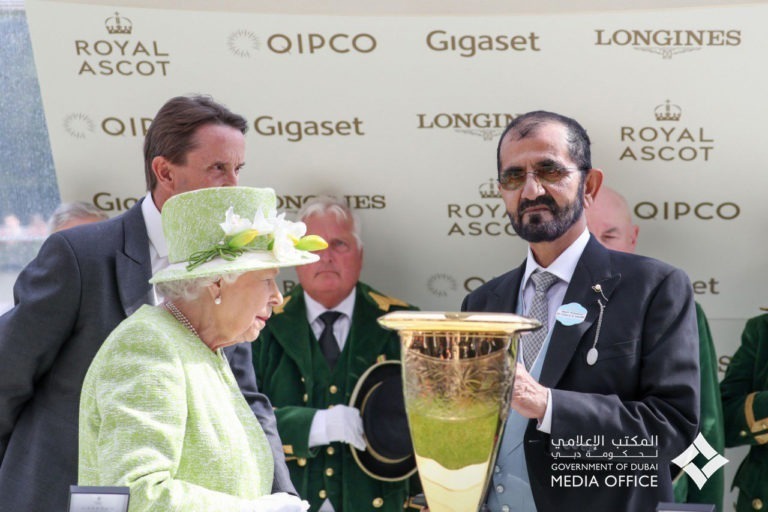
Sheikh Mohammed has been found by a UK high court to have organised the kidnapping of his adult daughter Princess Shamsa, while another daughter, Princess Latifa, claims she is being held hostage in Dubai.
Declassified previously found that Queen Elizabeth has met Dubai’s repressive ruler on at least 10 occasions in the past decade and gave him a horse racing award a year after Latifa had fled Dubai and been forcibly returned.
Dubai-based company DP World has invested more than £2-billion in the UK, including in the port of Southampton and P&O Ferries.
Such investments from the UAE into the UK are increasing. Last month, Mubadala, an Abu Dhabi investment fund, announced it will invest £800-million in UK life sciences, such as health, green energy and infrastructure. The final investment could total £5-billion.
In 2013, Boris Johnson, who was then the Mayor of London, joked about the UK being the “eighth emirate”. That year, a secret Whitehall unit was put together to procure UAE investments. This gave the Emirates privileged access to the UK’s political and business sectors.
Lord Deighton oversaw the project, producing a “beauty parade” of prime land deals and world-famous institutions.
Bahrain: £2.5-billion
Bahrain’s repressive king, Hamad, is another close UK ally and a personal friend of the Queen, and the British government promotes an array of military and police programmes supporting Bahrain’s regime and its internal “security”.
In February, the king bought Glympton Park, a £120-million country estate in the Cotswolds in southern England, from Saudi Arabia’s Prince Bandar.
While there are few figures available covering the true extent of Bahrain’s investment in the UK, the regime’s sovereign wealth fund owns a majority stake in British car manufacturer McLaren. Based on the company’s value of £2.4-billion, the investment may be worth £1.5-billion.
Bahrain-based investment fund GFH Financial Group has a majority stake in a British real estate manager which has assets worth more than £1.4-billion.
UK in the Gulf
While the Gulf regimes invest heavily in Britain, UK companies also have significant stakes in those states, mainly in energy and infrastructure projects.
Britain’s investments in the UAE are valued at around £14.6-billion and in Saudi Arabia at £5.3-billion. In Oman, a repressive British ally ruled by Sultan Haitham, the UK is the biggest foreign investor, with one recent report suggesting that the figure could be as high as £14.9-billion.
The government’s UK Export Finance (UKEF), which promotes exporters and foreign investments, has financed more than £2.34-billion in oil projects in Bahrain, Oman, Saudi Arabia and Kuwait.
Projects also include arms deals. In 2018, the UK provided export credit worth £4.2-billion for British arms companies to sell to Qatar, the biggest deal in UKEF’s history.
A government spokesperson said: “The UK has strong, historic bilateral ties in the Gulf which are vital to UK prosperity and security. No aspect of this engagement prevents the UK from consistently acting on matters on which we do not agree, including human rights. The strength of our relationship with these countries allows us to speak frankly. Where we have concerns, we will always raise them.”

